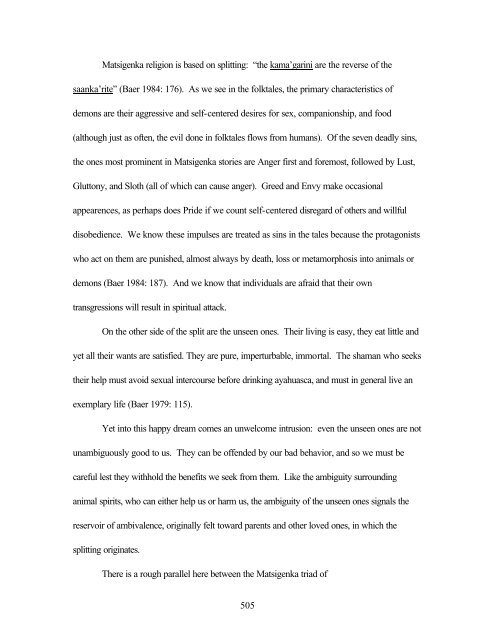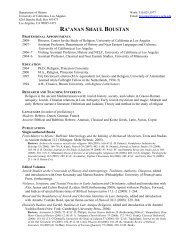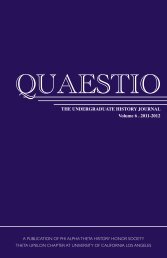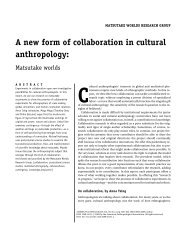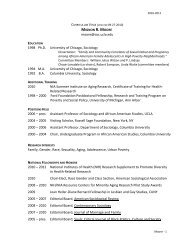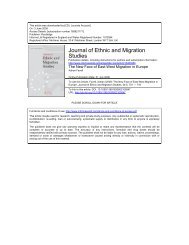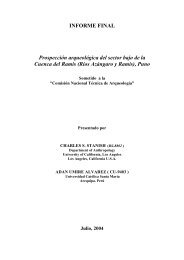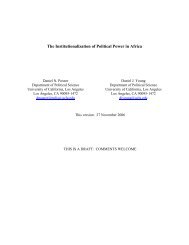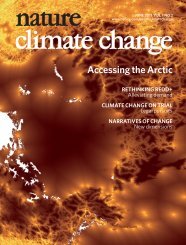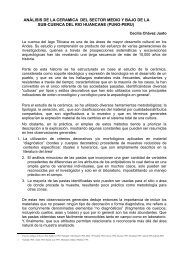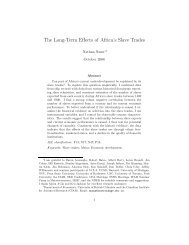433 Chapter Seven Cosmos For the Matsigenka of Shimaa, kameti ...
433 Chapter Seven Cosmos For the Matsigenka of Shimaa, kameti ...
433 Chapter Seven Cosmos For the Matsigenka of Shimaa, kameti ...
Create successful ePaper yourself
Turn your PDF publications into a flip-book with our unique Google optimized e-Paper software.
<strong>Matsigenka</strong> religion is based on splitting: “<strong>the</strong> kama’garini are <strong>the</strong> reverse <strong>of</strong> <strong>the</strong><br />
saanka’rite” (Baer 1984: 176). As we see in <strong>the</strong> folktales, <strong>the</strong> primary characteristics <strong>of</strong><br />
demons are <strong>the</strong>ir aggressive and self-centered desires for sex, companionship, and food<br />
(although just as <strong>of</strong>ten, <strong>the</strong> evil done in folktales flows from humans). Of <strong>the</strong> seven deadly sins,<br />
<strong>the</strong> ones most prominent in <strong>Matsigenka</strong> stories are Anger first and foremost, followed by Lust,<br />
Gluttony, and Sloth (all <strong>of</strong> which can cause anger). Greed and Envy make occasional<br />
appearences, as perhaps does Pride if we count self-centered disregard <strong>of</strong> o<strong>the</strong>rs and willful<br />
disobedience. We know <strong>the</strong>se impulses are treated as sins in <strong>the</strong> tales because <strong>the</strong> protagonists<br />
who act on <strong>the</strong>m are punished, almost always by death, loss or metamorphosis into animals or<br />
demons (Baer 1984: 187). And we know that individuals are afraid that <strong>the</strong>ir own<br />
transgressions will result in spiritual attack.<br />
On <strong>the</strong> o<strong>the</strong>r side <strong>of</strong> <strong>the</strong> split are <strong>the</strong> unseen ones. Their living is easy, <strong>the</strong>y eat little and<br />
yet all <strong>the</strong>ir wants are satisfied. They are pure, imperturbable, immortal. The shaman who seeks<br />
<strong>the</strong>ir help must avoid sexual intercourse before drinking ayahuasca, and must in general live an<br />
exemplary life (Baer 1979: 115).<br />
Yet into this happy dream comes an unwelcome intrusion: even <strong>the</strong> unseen ones are not<br />
unambiguously good to us. They can be <strong>of</strong>fended by our bad behavior, and so we must be<br />
careful lest <strong>the</strong>y withhold <strong>the</strong> benefits we seek from <strong>the</strong>m. Like <strong>the</strong> ambiguity surrounding<br />
animal spirits, who can ei<strong>the</strong>r help us or harm us, <strong>the</strong> ambiguity <strong>of</strong> <strong>the</strong> unseen ones signals <strong>the</strong><br />
reservoir <strong>of</strong> ambivalence, originally felt toward parents and o<strong>the</strong>r loved ones, in which <strong>the</strong><br />
splitting originates.<br />
There is a rough parallel here between <strong>the</strong> <strong>Matsigenka</strong> triad <strong>of</strong><br />
505


